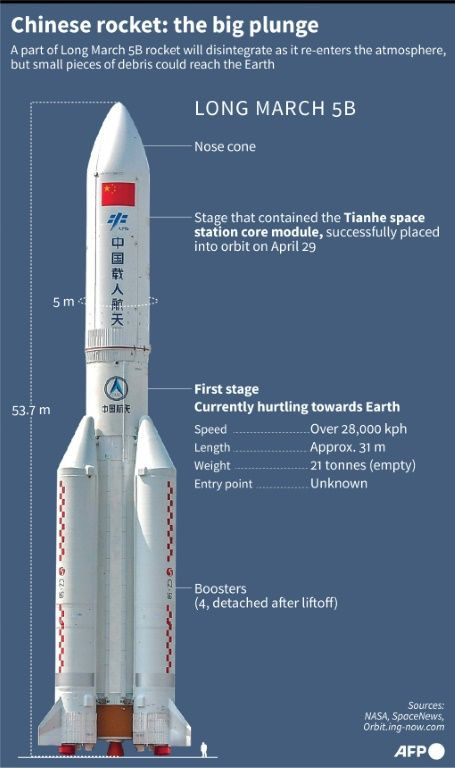NASA Slams China For Rocket Debris That Crashed Near Maldives
KEY POINTS
- NASA slammed China for "failing to meet responsible standards" for its space debris
- This came after debris from the country's Long March 5B rocket landed in the Indian Ocean near the Maldives early Sunday
- China's space agency said most of the rocket burned up upon reentering the atmosphere
NASA administrator Sen. Bill Nelson has criticized China for "failing to meet responsible standards" for its space debris.
News of debris from the Chinese Long March 5B rocket was met with disapproval when experts projected that it would likely re-enter the Earth's atmosphere and crash. China’s space administration then confirmed that remnants of its biggest rocket landed in the Indian Ocean west of the Maldives early Sunday morning, Reuters reported.
Although most of the rocket's components burned up as it reentered Earth's atmosphere, the head of NASA emphasized that the safety of the people and property on Earth must be prioritized for space missions.
"Spacefaring nations must minimize the risks to people and property on Earth of re-entries of space objects and maximize transparency regarding those operations," said Nelson in a statement shared on the NASA website. “It is clear that China is failing to meet responsible standards regarding their space debris."
“It is critical that China and all spacefaring nations and commercial entities act responsibly and transparently in space to ensure the safety, stability, security, and long-term sustainability of outer space activities," he continued.
Jonathan McDowell, an astrophysicist at the Astrophysics Center at Harvard University who tracked the rocket debris, also said on Twitter, "An ocean reentry was always statistically the most likely. It appears China won its gamble... But it was still reckless."
The rocket re-entered Earth’s atmosphere over the Arabian Peninsula, the U.S. Space Command confirmed. It is not clear if any debris had landed on the Maldives.
The rocket, which was the second deployment of the 5B variant since it first launched in May 2020, was tasked to send a piece of a new Chinese space station into orbit on April 29. The rocket was eventually left to float in space after using up all its fuel until it eventually made its way back to Earth due to the planet's gravity.
Last year, debris from the first Long March 5B damaged several buildings when it fell on Ivory Coast, Reuters reported. No injuries were reported in that incident.
The threat of space debris falling on Earth's land surface is not negligible. Fortunately, the planet is largely covered by oceans so the chances of catastrophic impacts that could potentially endanger human lives and livelihood are pretty slim.
Despite the space community's efforts to better regulate debris from spacecraft, Earth's orbit remains littered with hundreds of thousands of "space junk" of varying sizes.
"Norms have been established," McDowell told CNN. "There's no international law or rule — nothing specific — but the practice of countries around the world has been: 'Yeah, for the bigger rockets, let's not leave our trash in orbit in this way.'"

© Copyright IBTimes 2024. All rights reserved.





















